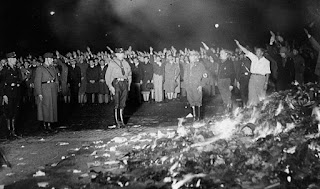On May 6, 1933, Nazi demonstrators raided the libraries of the Institut für Sexualwissenschaft, a German name that roughly translates to the Institute of Sexology. The Institute was a privately operated research space for studies of human sexuality. More than 12,000 books were taken from shelves and burned days later in the streets by Nazi youth groups.
It was a devastating blow to the life’s work of Magnus Hirschfeld, the institute’s founder. Hirschfeld, who was Jewish and gay, was a pioneer for rights and liberation in Berlin’s thriving LGBTQ community. He founded the institute in 1919, after beginning his career as an activist in 1896 with his pamphlet Sappho and Socrates, about a gay man who took his own life after he felt he was being coerced into a straight marriage.
This happens only a few months after Adolf Hitler was officially appointed chancellor of Germany on January 30, 1933.

